The Importance of Follow-Up Care in Hearing Health
Getting hearing aids is an important first step, but ongoing follow-up


Getting hearing aids is an important first step, but ongoing follow-up

When someone you care about starts having trouble hearing, it affects the

Travel puts your ears through more than you might realize. Whether